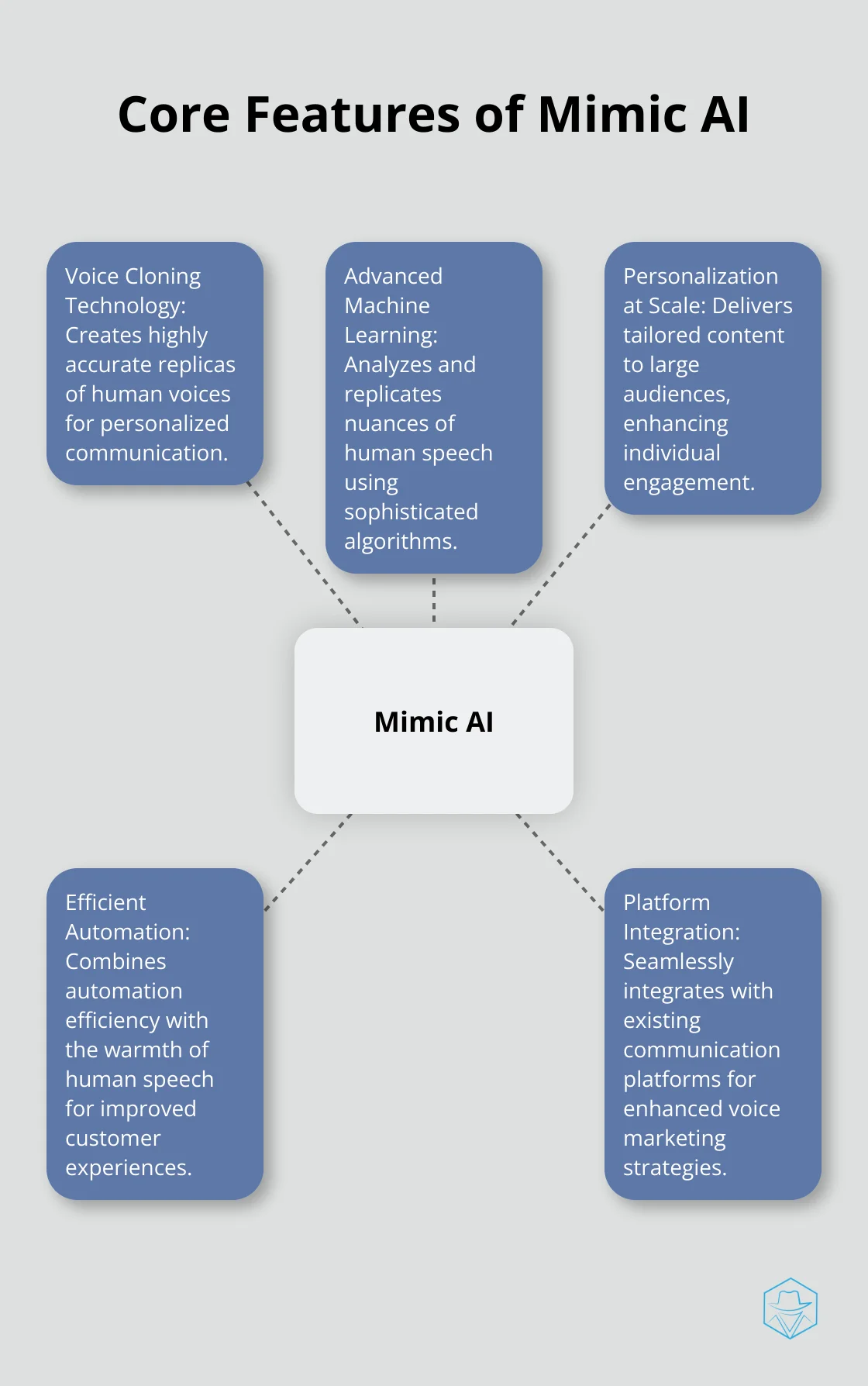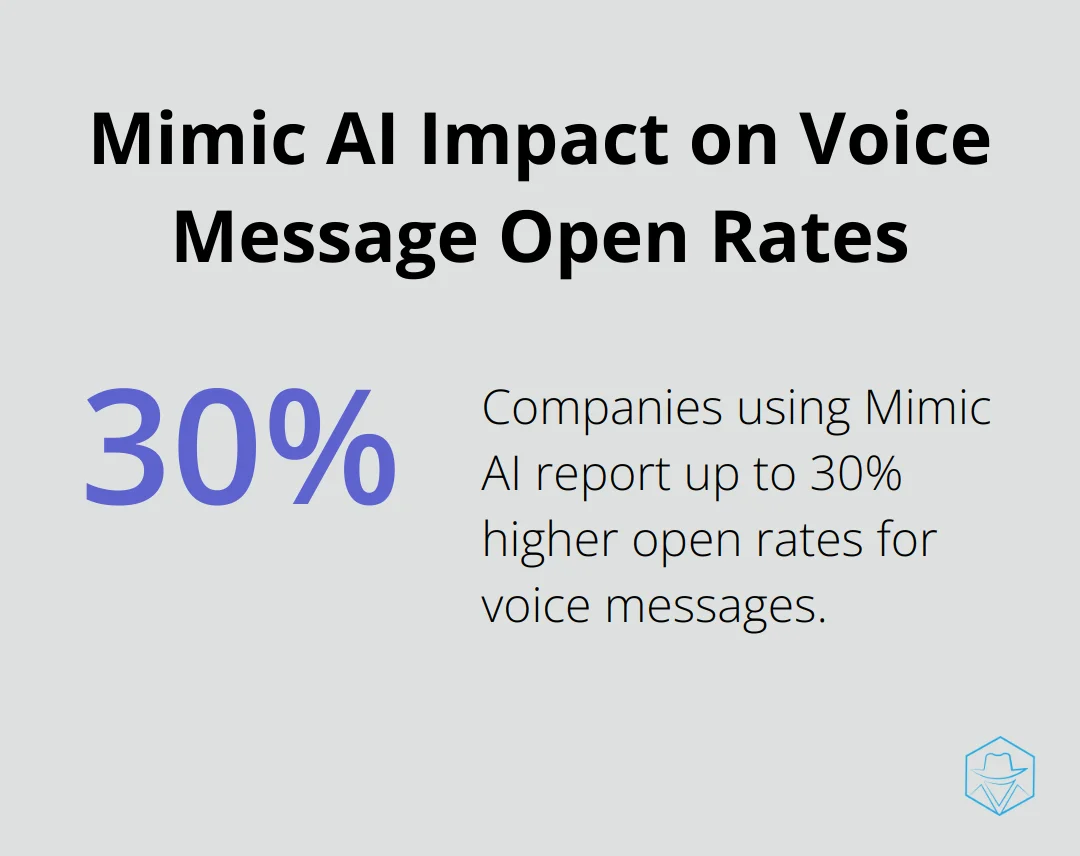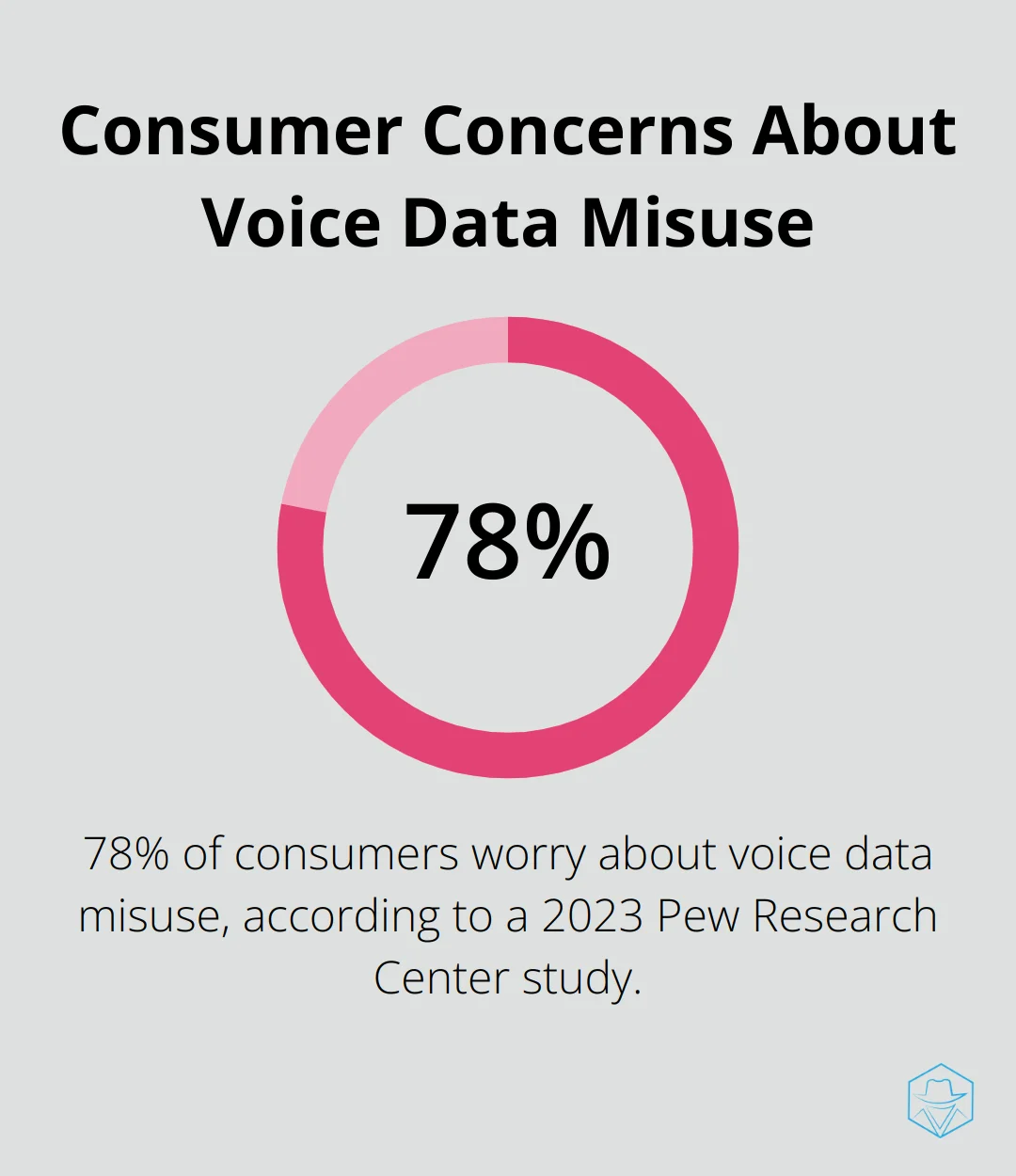Is Mimic AI the Future of Voice Marketing?

Voice marketing is evolving rapidly, and Mimic AI is at the forefront of this transformation. This innovative technology promises to revolutionize how businesses communicate with their customers through personalized voice messages.
At Drop Cowboy, we’re excited to explore the potential of Mimic AI and its impact on the future of voice marketing. In this post, we’ll examine the benefits, challenges, and ethical considerations surrounding this cutting-edge technology.
What Is Mimic AI?
The Core of Voice Cloning Technology
Mimic AI represents a revolutionary advancement in voice marketing technology. This sophisticated voice cloning system creates highly accurate replicas of human voices. Businesses can now generate personalized voice messages at scale, transforming how they communicate with customers.
Advanced Machine Learning in Action
The science behind Mimic AI relies on advanced machine learning algorithms. These algorithms analyze and replicate the nuances of human speech. With just a few minutes of recorded audio, the system captures unique vocal characteristics (tone, pitch, and rhythm). The result? Synthetic voices that sound almost identical to the original speaker.
Personalization Reaches New Heights
Mimic AI’s most powerful feature lies in its ability to create personalized voice messages for large audiences. Businesses no longer need to rely on generic, pre-recorded messages. Instead, they can deliver tailored content that resonates with each individual recipient (a feat previously impossible with traditional voice marketing methods).
A New Era of Voice Marketing
Traditional voice marketing often depends on robotic-sounding automated messages or expensive, time-consuming recordings by voice actors. Mimic AI offers an innovative middle ground. It combines the efficiency of automation with the warmth and authenticity of human speech. This approach leads to higher engagement rates and improved customer experiences.

Integration with Existing Platforms
Many communication platforms now integrate Mimic AI technology into their offerings. This integration allows clients to create personalized messages that drive results. Companies that leverage this cutting-edge technology can significantly enhance their voice marketing strategies and build stronger connections with their audience.
The potential of Mimic AI extends beyond simple message delivery. Its ability to clone voices opens up new possibilities for interactive voice responses, personalized audio content, and even voice-driven customer service. As we explore these possibilities, it’s important to consider the benefits and challenges that come with this powerful technology.
How Mimic AI Benefits Businesses
Boosting Engagement Rates
Mimic AI revolutionizes voice marketing, yielding remarkable results in engagement rates. A study by Juniper Research projects AI-powered voice assistants will handle 8 billion customer service interactions by 2023, underscoring the growing acceptance of technologies like Mimic AI.
Companies that implement Mimic AI report up to 30% higher open rates for their voice messages compared to traditional methods. The personal touch of a familiar voice compels recipients to listen and respond, which leads to improved conversion rates and customer retention.

Unparalleled Cost-Efficiency and Scalability
Mimic AI offers a cost-effective solution for businesses of all sizes. Traditional voice marketing often requires expensive voice actors or robotic-sounding automated systems. Mimic AI eliminates these costs while providing a more personalized experience.
A mid-sized e-commerce company reported a 40% reduction in their voice marketing budget after adopting Mimic AI, while simultaneously increasing their outreach by 300%. This scalability allows businesses to reach larger audiences without proportionally increasing costs.
Elevating Customer Experience Through Personalization
Mimic AI takes personalization to new heights, creating a more engaging and memorable customer experience. An Accenture survey found that 91% of consumers prefer to shop with brands that recognize, remember, and provide relevant offers and recommendations.
With Mimic AI, businesses create tailored voice messages that address customers by name, reference past interactions, and adjust the tone and pace based on customer preferences. This level of personalization fosters a stronger emotional connection between the brand and the customer, leading to increased loyalty and lifetime value.
Seamless Integration with Existing Platforms
Many communication platforms now incorporate Mimic AI technology into their offerings. This integration allows businesses to create personalized messages that drive results. Companies that leverage this cutting-edge technology can significantly enhance their voice marketing strategies and build stronger connections with their audience.
The potential of Mimic AI extends beyond simple message delivery. Its ability to clone voices opens up new possibilities for interactive voice responses, personalized audio content, and even voice-driven customer service (areas that were previously limited by technology or cost constraints).
As we explore the numerous benefits of Mimic AI for businesses, it’s important to address the ethical considerations and challenges that come with this powerful technology. The next section will examine these critical aspects and provide insights on how businesses can navigate them responsibly.
Navigating the Ethical Landscape of Voice Cloning
The Privacy Challenge
Voice cloning technology presents significant privacy concerns. A 2023 Pew Research Center study revealed that 78% of consumers worry about voice data misuse. This fear is not unfounded. Kaspersky, a cybersecurity firm, reported a 400% increase in voice-based phishing attacks using AI-generated voices in 2022.

Businesses must implement robust data protection measures to address these concerns. These measures include end-to-end encryption for voice data, regular security audits, and clear data retention policies. Companies should also consider partnerships with third-party security firms to validate their protection measures.
Consent and Transparency: Essential Pillars
Obtaining explicit consent for voice cloning is non-negotiable. The Federal Trade Commission (FTC) has issued guidelines that require companies to disclose the use of AI-generated voices in marketing communications. Non-compliance can result in hefty fines and reputational damage.
We recommend a clear opt-in process for voice cloning services. This process should include detailed information about voice data usage, storage, and protection. Businesses should also provide easy opt-out options and regular reminders about data usage.
Balancing Authenticity and Personalization
Personalization enhances customer experience, but maintaining authenticity is essential. A 2024 Accenture survey found that 62% of consumers feel uncomfortable when they can’t distinguish between human and AI-generated voices.
To strike the right balance, businesses should consider a hybrid approach. This approach could involve AI-generated voices for initial outreach, followed by human interaction for more complex conversations. Transparency about AI use in voice communications is also critical (perhaps through a brief disclosure at the beginning of each message).
Ethical Guidelines for Voice Cloning
Companies must establish clear ethical guidelines for voice cloning technology use. These guidelines should address issues such as:
- Respect for individual privacy rights
- Prohibition of voice cloning without explicit consent
- Limitations on the use of cloned voices in sensitive contexts
- Regular audits to ensure compliance with ethical standards
The Role of Regulation
As voice cloning technology advances, regulation will play a crucial role in shaping its ethical use. Companies should stay informed about emerging regulations and proactively adapt their practices. This proactive approach will help build trust with consumers and mitigate potential legal risks.
Ethical use of voice cloning technology goes beyond legal requirements. It’s crucial to respect communication frequency, provide genuine value, and ensure transparency in all voice marketing efforts.
Final Thoughts
Mimic AI transforms voice marketing with unparalleled personalization and efficiency. It clones voices and delivers tailored messages at scale, revolutionizing customer communication. The technology significantly improves engagement rates, cost-effectiveness, and customer experience.
Businesses must address privacy concerns, ethical considerations, and transparency head-on. They need to implement robust data protection measures, obtain explicit consent, and establish clear ethical guidelines for voice cloning technology use. Striking the right balance between personalization and authenticity will maintain consumer trust.
Drop Cowboy offers businesses the tools to create personalized voice messages that drive engagement while maintaining compliance and respecting customer privacy. We help businesses navigate this new landscape and unlock the full potential of AI-driven communication strategies (without compromising ethics). As voice marketing evolves, we remain committed to responsible innovation and meaningful customer connections.
blog-dropcowboy-com
Related posts

July 20, 2025
How to Use SimpleTexting API for SMS Integration
Enhance communication with SimpleTexting API integration. Automate SMS notifications and boost customer interaction easily.

August 4, 2025
When i call my husband it goes straight to voicemail
Solve the mystery of “When I call my husband, it goes straight to voicemail.” Find causes, solutions, and reconnect effortlessly with practical tips.

March 20, 2025
Marketing Automation in CRM: Benefits and Implementation
Explore marketing automation in CRM, its benefits, and implementation tips to streamline processes and boost customer engagement effectively.

June 10, 2025
Trello: The Ultimate Software for Project Management
Explore Trello software for project management: boost efficiency, streamline tasks, and enhance team collaboration with unmatched features today.

March 19, 2025
Who Are the Main Competitors of Twilio?
Explore competitors of Twilio and find out which companies are shaping the communication technology landscape with innovative solutions.

March 11, 2025
Send Appointment Reminders with Voice Broadcast
Boost efficiency with Voice Broadcast for appointment reminders. Reduce no-shows and enhance communication using this effective strategy.